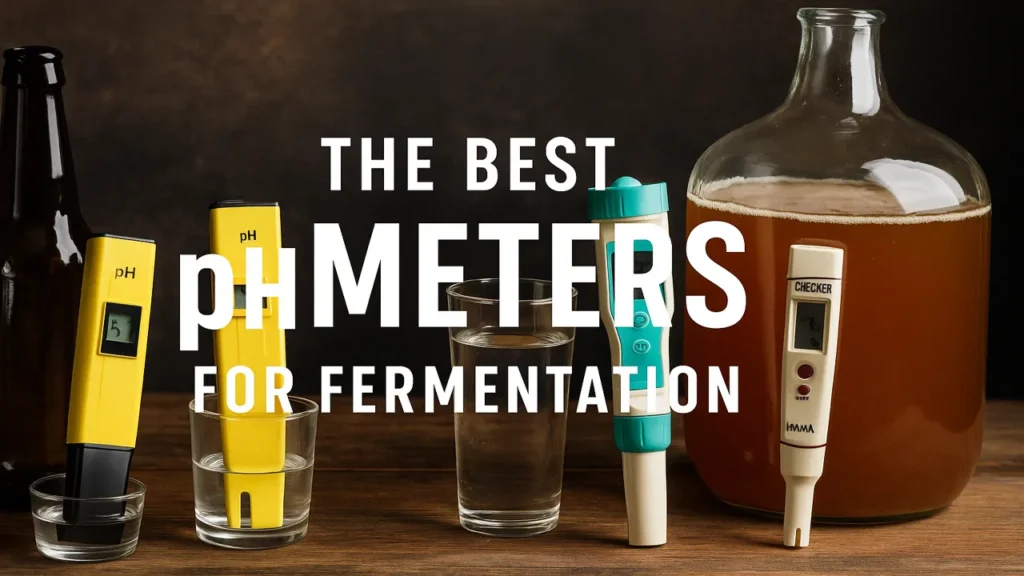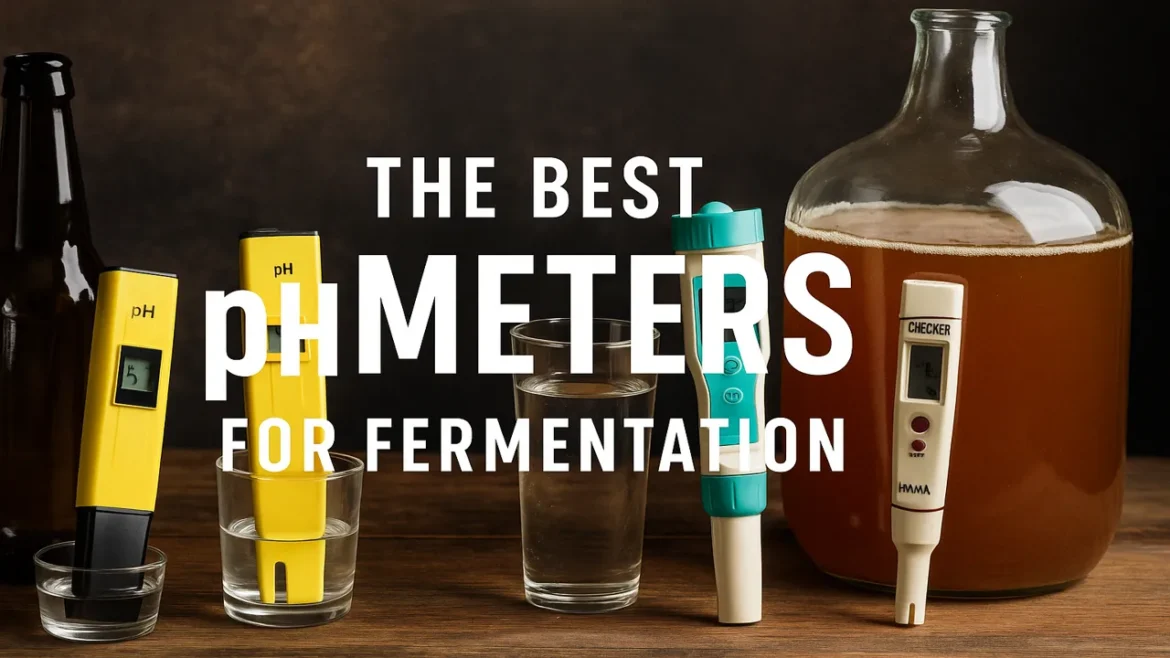Discover the best pH meters for fermentation to improve your brewing results. Compare top models with our interactive tool and learn proper calibration techniques for better beer, wine, and kombucha.
Every fermentation project—whether beer, wine, kombucha, or sourdough—has a secret ingredient that’s rarely discussed outside professional circles: pH monitoring. Ask any veteran homebrewer about their biggest game-changer, and many will point to the moment they started tracking pH levels. In this comprehensive guide, we’ll explore the best pH meters for fermentation processes, why they matter, and how to choose the perfect one for your brewing adventures.

Why pH Matters in Fermentation
Before diving into specific meters, let’s understand why pH monitoring is crucial for successful fermentation.
pH measures the acidity or alkalinity of a solution on a scale from 0 to 14, with 7 being neutral. In fermentation, pH affects:
- Enzyme activity: Different enzymes function optimally at specific pH ranges
- Yeast and bacteria performance: Microorganisms have preferred pH environments
- Contamination prevention: Many harmful bacteria cannot survive in acidic environments
- Flavor development: pH directly influences taste, mouthfeel, and aroma
- Fermentation efficiency: Optimal pH accelerates fermentation and prevents stalling
According to the American Society of Brewing Chemists, even small pH variations of 0.2-0.3 units can dramatically affect your final product. As Sophia Chen, our Beer Chemistry Specialist, often says: “Brewing without monitoring pH is like driving blindfolded—you might reach your destination, but the journey will be far more stressful and unpredictable.”
Different Types of pH Meters for Fermentation
pH meters generally fall into several categories, each with distinct advantages:
| Type | Typical Price Range | Pros | Cons | Best For |
|---|---|---|---|---|
| Digital Handheld | $50-150 | Portable, easy to use, moderate accuracy | Requires regular calibration, limited lifespan | Most homebrewers, general fermentation |
| Benchtop Laboratory | $200-800+ | High accuracy, durability, additional features | Expensive, less portable, steeper learning curve | Professional brewing, advanced homebrewers |
| pH Strips/Papers | $5-15 | Very affordable, no calibration | Low accuracy, subjective reading, single-use | Beginners, extremely casual use |
| Digital pH Controllers | $100-300 | Continuous monitoring, can automatically adjust pH | Complex setup, higher cost | Continuous fermentation systems, hydroponics |
| Portable Pocket Testers | $30-80 | Highly portable, moderate accuracy | Limited features, less durable | Mobile brewers, field testing |
For more detailed information about brewing equipment essentials, check out our comprehensive guide to Homebrewing Equipment & Tools: What You Need.
Interactive pH Meter Comparison Tool
| pH Meter | Price Range | Accuracy | Best For | Key Features |
|---|
Accurate pH monitoring is critical for consistent, high-quality fermentation results. Even small pH variations (0.2-0.3 units) can significantly impact enzyme activity, yeast health, flavor development, and fermentation efficiency.
The right pH meter for your needs will depend on your brewing style, frequency of use, and specific requirements. Generally, beginners can start with affordable models (±0.2 pH accuracy), while advanced brewers benefit from more precise instruments (±0.01 pH accuracy).
Top 10 pH Meters for Fermentation
Now, let’s examine the best pH meters currently available for various fermentation applications.
1. Milwaukee MW102 Standard Portable pH Meter
Price Range: $90-120
Accuracy: ±0.02 pH
Special Features: Temperature compensation, replaceable electrode
The Milwaukee MW102 has earned its reputation as the workhorse of homebrewing pH meters. With automatic temperature compensation (ATC) and a replaceable electrode, it offers excellent value for serious homebrewers.
Mark Kegman, our Product Testing Expert, notes: “After testing dozens of meters, the MW102 consistently provides professional-grade accuracy without breaking the bank. Its replaceable electrode extends its lifespan significantly compared to fixed-probe models.”
The meter comes with calibration solutions and a carrying case, making it ready to use right out of the box. Its battery life exceeds 300 hours of use, perfect for those marathon brewing weekends.
2. Apera Instruments AI311 Premium pH Pocket Tester
Price Range: $70-90
Accuracy: ±0.01 pH
Special Features: Bluetooth connectivity, replaceable sensor, dustproof/waterproof (IP67)
Apera has quickly become a favorite among fermentation enthusiasts for combining laboratory accuracy with user-friendly design. The AI311 offers exceptional water resistance (IP67 rated), making it perfect for brewery environments where spills are inevitable.
What sets this meter apart is its Bluetooth functionality, allowing data logging directly to your smartphone—perfect for tracking pH changes throughout fermentation. According to Brewing Science Institute, consistent pH documentation is essential for reproducing successful brews.
3. Hanna Instruments HI98100 Checker Plus
Price Range: $40-60
Accuracy: ±0.2 pH
Special Features: Ultra-compact design, replaceable electrode, automatic shut-off
For brewers seeking an affordable entry point to pH measurement, the HI98100 offers remarkable value. While not as accurate as premium options, its ±0.2 pH accuracy is sufficient for most brewing applications.
John Brewster, our Lead Brewer, recommends this model for new homebrewers: “The Checker Plus democratizes pH measurement. It’s accurate enough for critical brewing steps like mash pH and monitoring kettle souring, without requiring a significant investment.
The large LCD display and simple one-button calibration make it particularly user-friendly for beginners.
4. Bluelab PENPH pH Pen
Price Range: $90-120
Accuracy: ±0.1 pH
Special Features: Backlit display, waterproof design, double-junction probe
While originally designed for hydroponics, the Bluelab pH Pen has found a devoted following among fermenters. Its double-junction probe resists clogging from protein-rich brewing samples, extending electrode life significantly.
The backlit display proves particularly useful when checking pH in dim fermentation cellars or during early morning brewing sessions. The fully waterproof design provides additional durability in wet brewing environments.
5. Apera Instruments PH60 Premium pH Pocket Tester
Price Range: $60-80
Accuracy: ±0.01 pH
Special Features: Glass bulb sensor, auto-recognition of buffer solutions
The PH60 hits the sweet spot between affordability and accuracy. Its glass bulb sensor—the same technology used in laboratory equipment—provides exceptional sensitivity and response time compared to many competitors using plastic-bodied sensors.
One standout feature is its ability to automatically recognize pH buffer solutions, simplifying the calibration process significantly. According to American Homebrewers Association, proper calibration is the most commonly overlooked aspect of pH measurement among homebrewers.
6. Milwaukee MW101 Economy Portable pH Meter
Price Range: $50-70
Accuracy: ±0.1 pH
Special Features: Manual calibration, basic temperature compensation
The MW101 represents the entry-level option from Milwaukee, offering acceptable accuracy at a budget-friendly price. While lacking some premium features, it provides reliable readings for primary fermentation monitoring.
This meter requires manual temperature adjustment rather than automatic temperature compensation, making it slightly less convenient but considerably more affordable than advanced models.
7. Hanna Instruments HI9813-6 Portable pH/EC/TDS/°C Meter
Price Range: $180-220
Accuracy: ±0.1 pH
Special Features: All-in-one measurement of pH, conductivity, TDS, and temperature
For advanced brewers tracking multiple water parameters, the HI9813-6 offers exceptional versatility. Beyond pH, it measures electrical conductivity (EC), total dissolved solids (TDS), and temperature in a single device.
Lisa Fermenta, our Fermentation Specialist, explains: “When crafting complex styles like Belgian sours or lambics, monitoring both pH and TDS provides critical insights into fermentation progress and microbial activity. The HI9813-6 eliminates the need for multiple testing devices.”
8. Dr. Meter PH100 Digital pH Meter
Price Range: $30-50
Accuracy: ±0.1 pH
Special Features: Auto-calibration, LCD backlight, auto temperature compensation
If budget is your primary concern, the Dr. Meter PH100 offers surprising capability at an entry-level price point. While not as durable or accurate as premium options, it provides acceptable readings for basic brewing applications.
The auto-calibration feature simplifies setup for beginners, though experienced brewers may find its accuracy limitations frustrating for precision-critical applications like kettle souring or wild fermentation.
9. Extech PH220-C Palm pH Meter with Clog-Free Electrode
Price Range: $120-160
Accuracy: ±0.02 pH
Special Features: Clog-resistant electrode, data hold function, weighted base design
Extech’s offering stands out with its specialized clog-free electrode, designed specifically for measuring viscous liquids—perfect for checking pH in thick wort, fruit purees, or dense slurries.
The weighted base allows the meter to stand upright on flat surfaces, freeing your hands during measurements. Its data hold function captures readings until you’re ready to record them, particularly useful in busy brewing environments.
10. Atlas Scientific Lab Grade pH Probe with EZO Circuit
Price Range: $150-200
Accuracy: ±0.02 pH
Special Features: Industrial-grade durability, digital signal processing, scientific calibration
For those seeking laboratory-grade precision and exceptional durability, Atlas Scientific’s pH system represents the gold standard. While more complex to set up than consumer models, it offers unmatched accuracy and longevity.
This system is particularly valuable for brewers developing automated fermentation systems, as it can easily integrate with Arduino or Raspberry Pi controllers for continuous pH monitoring and adjustment.
How to Choose the Right pH Meter for Your Brewing Needs
With so many options available, selecting the appropriate pH meter requires considering several factors:
1. Accuracy Requirements
Different fermentation processes have different accuracy needs:
- Beer Brewing: ±0.1 pH generally sufficient (mash pH typically 5.2-5.6)
- Sourdough: ±0.2 pH acceptable (broader pH range of 3.5-5.5)
- Kettle Souring: ±0.05 pH preferable (precise control between 3.2-3.8)
- Wine Making: ±0.02 pH recommended (narrow target ranges)
2. Frequency of Use
How often you’ll measure pH impacts the type of meter to select:
- Occasional Use (monthly or less): Budget-friendly options like pH strips or entry-level digital meters
- Regular Use (weekly): Mid-range digital meters with replaceable electrodes
- Intensive Use (daily): Professional-grade meters with extended electrode lifespan
3. Probe/Electrode Type
The sensor is the most critical component of any pH meter:
- Glass Bulb: Most accurate, faster response, but fragile
- Flat Surface: More durable, easier to clean, but slightly less accurate
- Double Junction: Resistant to clogging, ideal for protein-rich samples
- Refillable: Longest lifespan, but requires maintenance
4. Additional Features to Consider
Beyond basic pH measurement, consider these valuable features:
- Automatic Temperature Compensation (ATC): Adjusts readings based on sample temperature
- Waterproof Design: Essential in brewing environments
- Calibration Memory: Tracks when you last calibrated the device
- Data Logging: Records measurements over time
- Replaceable Electrodes: Extends the life of your investment
According to Ryan Brewtech, our Technology Specialist: “The most expensive pH meter isn’t always the best choice. Match the technology to your specific brewing needs and maintenance willingness. A properly maintained mid-range meter often outperforms a neglected premium model.”
Proper pH Meter Care and Calibration
Even the finest pH meter requires proper maintenance to remain accurate. Follow these essential practices:
Calibration Procedure
For accurate readings, calibrate your pH meter regularly following this procedure:
- Prepare fresh calibration solutions (typically pH 4.01, 7.01, and sometimes 10.01)
- Rinse electrode with distilled water between solutions
- Calibrate with pH 7.01 solution first, then pH 4.01
- Store calibration solutions in sealed containers away from light
- Follow manufacturer’s specific calibration instructions
Electrode Storage
The storage method dramatically affects electrode lifespan:
- Short-term Storage (days): Keep in electrode storage solution or pH 4 buffer
- Medium-term Storage (weeks): Use specialized electrode storage solution
- Long-term Storage (months): Follow manufacturer guidelines (often involves filling cap with storage solution)
Never store electrodes in distilled water, as this damages the sensitive glass membrane.
Cleaning and Maintenance
Regular maintenance prevents drift and extends electrode life:
- Clean electrode with appropriate solution based on contaminant type
- For protein residues (common in brewing): Use enzymatic cleaners
- For mineral deposits: Use diluted acid cleaners
- Always rinse thoroughly with distilled water after cleaning
- Check for visible damage to bulb or junction regularly
Tyler Yeastman, our Microbiology Expert, emphasizes: “The single biggest mistake brewers make is improper electrode storage. Even an expensive meter will fail prematurely if the electrode dries out between uses.”
Common pH Measurement Mistakes in Brewing
Avoid these frequent errors that compromise accuracy:
- Testing at incorrect temperatures: Sample temperature affects pH readings
- Measuring carbonated samples directly: CO₂ artificially lowers pH readings
- Using expired calibration solutions: Buffers degrade over time
- Taking readings too quickly: Electrodes need time to stabilize
- Contaminating samples: Residue on the electrode can affect readings
- Ignoring temperature compensation: pH varies with temperature
Dave Hopson, our Beer Culture Analyst, notes: “Many brewers invest in quality pH meters but undermine their accuracy through improper technique. Taking time to degas samples and allow readings to stabilize makes all the difference in measurement reliability.”
Beyond Basic pH Measurement: Advanced Applications
For experienced brewers seeking deeper insights, modern pH meters enable several advanced techniques:
Mash pH Profiles
Tracking pH changes throughout the mash reveals enzyme activity patterns:
- Measure pH immediately after dough-in
- Track pH drop during rest periods
- Observe pH stability as conversion completes
- Use data to refine water chemistry for future brews
Fermentation Tracking
pH changes during fermentation provide valuable insights:
- Wort acidification indicates active fermentation
- pH stabilization often signals fermentation completion
- Unexpected pH increases may indicate contamination
- Different yeast strains show characteristic pH profiles
Aging Prediction
For sour and wild fermentations, pH trajectory helps predict aging requirements:
- Rapid pH drop suggests aggressive souring
- Gradual pH changes indicate longer aging needs
- pH plateaus help identify optimal packaging timing
Budget-Friendly Alternatives to Digital pH Meters
While digital meters offer precision, budget constraints sometimes necessitate alternatives:
pH Strips
Price Range: $5-15 for 100 strips
Accuracy: ±0.5 pH (approximate)
Best Use Case: Quick checks, backup measurements
Quality pH strips from manufacturers like MicroEssential Lab can provide acceptable readings for less critical applications. For improved accuracy, use narrow-range strips that cover only the pH range relevant to your fermentation (typically 3.0-6.0 for most brewing).
Digital pH Testers Under $25
Several ultra-budget digital meters exist, but understand their limitations:
- Generally accurate within ±0.3-0.5 pH
- Often uncalibrated or with limited calibration options
- Typical lifespan of 6-12 months
- Best used for go/no-go decisions rather than precision measurements
Colorimetric Kits
Traditional brewing colorimetric kits use liquid reagents that change color based on pH:
- Simple to use with no electronics
- Visual matching to color charts
- Limited precision but adequate for basic brewing
- Cost-effective for occasional use
Technical Comparison: Top 5 pH Meters for Fermentation
For those seeking detailed specifications, this comprehensive comparison provides key technical details:
| Feature | Milwaukee MW102 | Apera AI311 | Hanna HI98100 | Bluelab PENPH | Apera PH60 |
|---|---|---|---|---|---|
| Accuracy | ±0.02 pH | ±0.01 pH | ±0.2 pH | ±0.1 pH | ±0.01 pH |
| Range | 0-14 pH | 0-14 pH | 0-14 pH | 0-14 pH | 0-14 pH |
| Calibration Points | 2-point | 3-point | 2-point | 2-point | 3-point |
| Temperature Compensation | Automatic | Automatic | Manual | Automatic | Automatic |
| Electrode Type | Replaceable | Replaceable | Replaceable | Fixed | Replaceable |
| Resolution | 0.01 pH | 0.01 pH | 0.1 pH | 0.1 pH | 0.01 pH |
| Waterproof Rating | IP54 | IP67 | IP67 | IP67 | IP65 |
| Battery Life | ~300 hours | ~2000 hours | ~700 hours | ~200 hours | ~2000 hours |
| Display Type | LCD | LCD | LCD | Backlit LCD | Backlit LCD |
| Warranty | 1 year | 2 years | 1 year | 1 year | 2 years |
pH Meter Troubleshooting Guide
Even quality pH meters occasionally experience issues. Here’s how to address common problems:
Drifting Readings
If your meter shows readings that won’t stabilize:
- Allow longer equilibration time (30-60 seconds)
- Check for air bubbles on the electrode
- Clean electrode with appropriate solution
- Verify sample isn’t actively changing (e.g., ongoing fermentation)
- Replace electrode if problem persists
Failed Calibration
When your meter won’t calibrate properly:
- Use fresh buffer solutions
- Check electrode for physical damage
- Clean electrode thoroughly
- Ensure correct calibration sequence (7 before 4)
- Verify temperature compensation is working
Slow Response Time
If electrode response becomes sluggish:
- Clean electrode with recommended solution
- Check for protein coating on bulb
- Verify junction isn’t clogged
- Soak in electrode rejuvenation solution
- Replace electrode if not improved
Investing in Quality pH Measurement
While budget constraints are real for many homebrewers, few investments deliver more quality improvement per dollar than proper pH measurement. Beyond troubleshooting problems, accurate pH monitoring provides the data needed to consistently reproduce your best brews.
As Mark Kegman summarizes: “When brewers ask me where to allocate their equipment budget, a quality pH meter is always near the top of my recommendations. It transforms brewing from an approximate art to a repeatable science.”
By selecting the appropriate pH meter for your specific fermentation needs, maintaining it properly, and using correct measurement techniques, you’ll gain unprecedented control over your fermentation processes—leading to more consistent, higher-quality results.
What’s your experience with pH meters in fermentation? Have you found a particular model that works exceptionally well for your brewing style? Share your thoughts in the comments below!
About the Author:
Sophia Chen holds a Ph.D. in Biochemistry and applies her scientific expertise to the art of brewing. She specializes in water chemistry and how mineral profiles affect beer characteristics. After working in quality control for a major craft brewery, Sophia now consults with homebrewers on optimizing their water profiles for specific beer styles. Her analytical approach helps demystify the science behind brewing, making complex chemical reactions accessible to hobbyists. She regularly conducts blind taste tests comparing beers brewed with different water compositions to demonstrate their impact on final flavors.

